 |
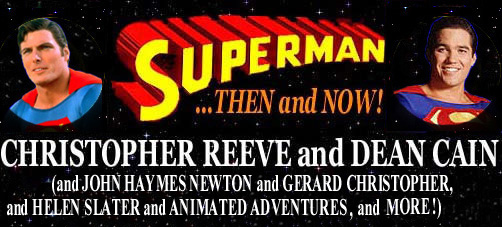

|

|

|

|

|
Blessed with a trio of maverick, successful producers (Alexander and Ilya Salkind and Pierre Spengler, "The Three Musketeers"), a huge budget, even by 21st century standards ($50-$70 million or more, borrowed from investors around the world, and from Warner, which released the film), a top-notch movie and TV director (Richard Donner, "The Omen"), industry-respected writers (Mario Puzo, "The Godfather", David Newman and Robert Benton, "Bonnie and Clyde", Leslie Newman, and Tom Mankiewicz, "Diamonds Are Forever"), and a cast filled with Screen Legends (including Marlon Brando, Gene Hackman, and Glenn Ford), the essential ingredient of Superman's feature film rebirth was the then-unknown soap opera actor cast as Superman/Clark Kent...and in 6'4" Christopher Reeve (1952-2004), a perfect Man of Steel would win hearts to this day!

|
Both commanding and shy, Reeve gave the character vulnerability and humanity, never camping him up, or insulting either the legend or it's fans. Whether flying gracefully over Metropolis, tossing nuclear missiles into space, or freeing a family cat from a tree, Reeve's Superman was everything fans had always dreamed of seeing, someday. And if his interpretation of Clark Kent seemed a bit...geeky...well, at least he made an effort to truly be two distinct characters, something neither Kirk Alyn or George Reeves had ever accomplished so convincingly!

|
Joined by a perfect supporting cast (Margot Kidder as a feisty Lois Lane, Marc McClure as Jimmy Olsen, and Jackie Cooper...a last-minute substitute for ailing Keenan Wynn...as Perry White), Reeve's near-decade tenure in the role would be the longest of any of the 'live' actors, until Tom Welling's "Smallville" TV series, over two decades later.
Despite the overwhelming box-office and very favorable reviews of the first "Superman" feature, the Salkinds and director Richard Donner were barely on speaking terms, throughout most of the production, as the film ran way over the projected shooting budget (the flying effects, in particular, proved extremely expensive and time-consuming to create), and Donner publicly lambasted the father/son team, and their 'hired gun' (Spengler), at every opportunity. Although 40-60% of the sequel ("Superman II") had already been filmed by Donner (production of both films had been started simultaneously), the director was unceremoniously fired, and replaced by Salkind associate, legendary director Richard Lester ("A Hard Day's Night", "The Three Musketeers"), who had assisted Donner, uncredited, in the first film.

|
Lester readily admitted he was not a big "Superman" fan, wasn't pleased with some of Richard Donner's ideas in the first film (such as creating three unique visual styles for Krypton, Smallville, and Metropolis), and would claim he reshot all of Donner's "Superman II" footage (which wasn't entirely true; enough of Donner's contributions remained, including all of Gene Hackman's scenes, as well as unused scenes with Marlon Brando, that a "Donner Edition" of "Superman II" was released on DVD in 2006, and even in 1980, he was grudgingly offered a 'co-Director' screen credit for the Lester version...which Donner, furious with the Salkinds' lies, machinations and cavalier attitude, bluntly refused). Lester did create a new opening, set at the Eifel Tower, reshot the Brando scenes with Susannah York (saving the Salkinds the Brando $12 million fee, but destroying the major lynchpin Jor-El played in the Superman Saga), revised the Superman/Lois romance at Niagra Falls, and expanded the action sequences (creating the 'Fortress of Solitude' climactic conflict), while adding his own offbeat humor and penchance for sight gags to the entire production.

|
The end result, while offering the first 'big screen' consummation by Superman and Lois, more physical humor and the greatest battles of the entire series, also showed a 'moving away' from the established Superman character (particularly in displaying powers and abilities he'd never had, previously, in comics or film), and a 'dumbing down' of the supporting cast, as well as the citizens of Metropolis (a Lester trademark).
Despite all the 'behind-the-scenes' tension, the film received generally favorable reviews, made even more money than the first film (opening on far more screens, at higher ticket prices), and "Superman III", again to be directed by Lester, was announced for a 1983 release. Ilya Salkind presented a very promising script outline to Warner, introducing the Man of Steel's second most-famous adversary, the planet-destroying, unstoppable, green-skinned android, Brainiac, as well as Superman's cousin, Supergirl. But Warner, despite being the parent company of DC Comics, vetoed the idea as too comic book(!) They wanted more humor, less exposition, and a big name co-star...
...and then America's hottest comedian at the time, Richard Pryor, appeared on "The Tonight Show", and joked that his biggest dream was to appear in a "Superman" movie. The comment made headlines in newspapers nationwide the next morning, and wasn't lost on Salkind (knowing Warner would jump at this, hearing overflowing cash registers ring). After some rapid negotiations (and a $4 million payday for the comedian), Salkind proudly announced that "Superman III" would co-star Pryor, in a script specifically tailored to his talents (which meant Superman and his mythos were going to take a pounding...)

|

|
Combining Pryor, as a fast-talking 'computer whiz'(??!!) who creates artificial Kryptonite, with Reeve's stoic, noble Superman was ill-conceived, and the result was disasterous! Pryor's 'over-the-top', occasionally ad-libbed comic style, combined with Richard Lester's penchance for slapstick (given free rein, now that Richard Donner's contributions had been used up), threw the entire Superman 'Universe' off-kilter. "Superman III" tossed out what little continuity remained from the first film (at the Smallville High School Reunion, pictures of young Christopher Reeve were displayed, rather than Jeff East, who had played the teenaged Clark, initially), and had none of the heart and sense of wonder, that were key elements of the first and second film. Despite Christopher Reeve at his peak, physically (he never looked more super), an intriguing subplot (involving Clark's rekindling a romance with high school sweetheart Lana Lang, as portrayed by future "Smallville" 'Martha Kent', Annette O'Toole), and an impressive junkyard brawl, devised by Ilya Salkind, between the Kryptonite-poisoned 'evil' Superman and 'noble' Clark Kent that Sigmund Freud would have loved analyzing, all of co-star Pryor's moments seemed forced, and remarkably unfunny, the 'super computer' plotline (featuring villainous Robert Vaughn) was more distasteful than exciting, the flying effects were unconvincing, and the series' regulars were largely ignored. Margot Kidder's Lois Lane only barely appeared (as unspoken punishment for publicly blasting the Salkinds for dumping Richard Donner), and Reeve, bitterly disappointed by the film, and the typecasting he was increasingly experiencing, announced he was 'finished' in the role.

|
Despite Ilya Salkind's claims that the film was a huge 'hit' (which he still believes, to this day), the terrible reviews and poor ticket sales soured the producers on Superman, and Salkind decided to explore other members of the Superman Family of characters, in film and on television (an option under the broad 25-year contract with Warner and DC Comics). When "Supergirl" flopped (see below), the Salkinds, frustrated, wanted a sabbatical from the franchise, but still had 14 years left in their agreement. Then Israeli producers Yoram Globus and Menahem Golan approached them, expressing an interest in producing their own "Superman" film. The Salkinds were more than happy to lease the Man of Steel's film rights out (for a hefty $5 million fee, of course)...

|

|
"Superman IV: The Quest for Peace" (1987), produced by Golan/Globus, and directed by Sidney J. Furie ("Iron Eagle"), was a failed attempt to establish 'B' movie factory Cannon Pictures (the "Death Wish" and "Missing in Action" series) as a major studio. With the Salkinds out of the picture, the original cast (including Gene Hackman, as Lex Luthor) were more than willing to return to their roles. Christopher Reeve, who had been adamant about hanging up his tights, for good, was lured back into the role by Cannon's promise to finance and release Reeve's pet project (a gritty urban drama, "Street Smart", co-starring Morgan Freeman), and greater involvement in the "Superman" production, serving as a second unit director, and co-writing the story, with Lawrence Konner and Mark Rosenthal.
At 35, Reeve had no desire to spend hours sweating in a gym, and refused to pump up into a Herculean-physiqued "Man of Steel", again, which resulted in his skinniest, least impressive appearance in the costume, ever...but compared to the MANY other problems with the film, his appearance was only a minor quibble! With a much smaller shooting budget than the previous films (which would be cut even further, during production), the FX were incredibly cheesy and obvious, the script was slow and indecisive (and often confusing, as 45 minutes were trimmed from the film prior to release), and the premise, as penned by Reeve (Superman taking a political stand, usurping the authority of every nation's sovereign government, and destroying the world's arsenal of nuclear weapons), while sincere, thrust the Man of Steel into a real-life controversy that ill-suited the escapist entertainment expected of a comic book hero. (It also played up the real, never-spoken reason why mankind is actually better off without super-powered, invulnerable beings; if they chose to rule Earth, and became dictators, who could stop them? Think about it...) Writer Tom Mankiewicz warned Reeve not involve Superman in this kind of scenario, but the actor, unfortunately, had to learn the hard way of the limits of his super alter-ego.

|
While a comic double-date between Lois and Superman, and Lacy Warfield (Mariel Hemingway) and Clark, was actually quite amusing (and is a film highlight, despite a lack of pacing to make it really 'bounce'), the plot became tedious, while defying logic (Lacy survives an extended period in the vacuum of space...without spacesuit or OXYGEN!), and the climactic lunar battle between the Man of Steel and Luthor-created Nuclear Man (Mark Pillow, sporting a ridiculous 80's bouffant hairdo) was certainly one of the least exciting action sequences of the entire Superman series.

|
The reviews for "Superman IV" were savage, and the box office, negligible. The "Superman" movie series, begun so auspiciously in 1978, was officially dead, and Christopher Reeve would never don the cape and tights, again.
Despite the "Superman IV" debacle, producers Golan and Globus, and Cannon Pictures, still holding the rights to make Superman movies, announced it would produce "Superman V" (despite the fact that NONE of the original cast would touch it). But the failures of their first "Superman" film, "Over the Top", their Sylvester Stallone 'Arm Wrestling' epic, and "Masters of the Universe", an earnest but badly-timed fantasy, based on the cartoon and toy line (both of which ran out of steam, just as the film was released), bankrupted the studio, and Cannon Pictures folded.
With the role of the Man of Steel behind him, Christopher Reeve would move on to other acting assignments, until a horrific incident in 1995 changed his life...the victim of a tragic horseback-riding accident that left him paralyzed from the neck down, he spent the last years of his life, despite his disability, traveling around the world, championing the cause of research for spinal cord injuries, and serving as a spokesperson for the handicapped...

|
He became, in the face of tragedy, a true SUPERMAN!

|
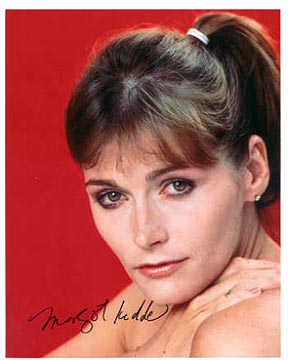
|

|

|

|

|
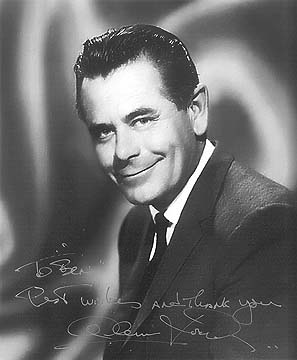
|

|

|
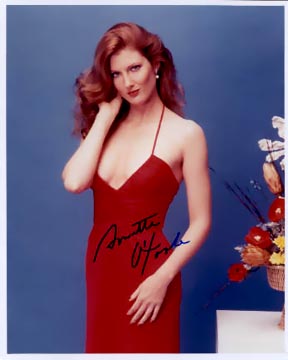
'Martha Kent' in 'Smallville', 2001-2007) |

|

|

|

|

|
After the less than stellar reviews and box office of "Superman III", producer Ilya Salkind decided to take the franchise a new direction, by returning to his earlier plan, and introducing Superman's cousin, Kara, to the big screen. He was vetoed by Warner, again, at introducing Brainiac, and was only given a $30 million budget, which ruled out an intergalactic epic. Deciding on a magical storyline, instead, the Salkinds pursued, unsuccessfully, Hollywood legend, Robert Wise, to direct. When he declined, French director Jeannot Szwarc was suggested; he had done a very credible job on "Jaws 2", and Christopher Reeve had spoken highly of him, when they made "Somewhere in Time", together, in 1980. Szwarc agreed to direct, on condition that grace, rather than super strength, be emphasized in the extraterrestrial heroine. With David Odell's screenplay in hand, Szwarc and the Salkinds looked for their Supergirl. Alexander Salkind wanted a major star as the lead, to boost ticket sales, and favored Brooke Shields, who tested well. But Ilya Salkind and Szwarc preferred an unknown, who wouldn't have the baggage of an established screen persona (which had worked, with Christopher Reeve, in "Superman"). After several hundred auditions, young Helen Slater (1963- ) tested; a recent graduate of New York City's School for the Performing Arts, the 19-year-old had only one screen credit, but leapt off the screen in her test, possessing a Grace Kelly-like combination of beauty, poise, and maturity, far beyond her years. She impressed everyone, immediately, was quickly signed, and began the physical training to wear the abbreviated costume and 'fly' in a harness.

|
The story of the Kryptonian girl's adventures while on Earth, searching for a missing Power Crystal that fueled her interdimensional home, Argo City, climaxing in an escape from the Phantom Zone, and Battle Royale with an evil witch, featured major stars (including Faye Dunaway as an even campier villain than in "Mommy Dearest", Peter O'Toole, and Mia Farrow), as well as a cameo by Marc McClure as Jimmy Olsen, and a chaste romance with hunky Hart Bochner. Sadly, Christopher Reeve, having announced he was 'finished' in the role, did not appear as Superman; his absence was explained by saying he was off on a mission to a "distant galaxy" (although it was doubtful even HE could have saved this convoluted mish-mash!)
The film was to be released by Warner, but the Salkinds refused the Summer, 1984 debut the studio demanded, and per the contract both parties had, the producers were then free to release through another studio (while Warner still received their cut); "Supergirl" became Tri-Star's major holiday release for 1984.

|
The move to Tri-Star, which had far less money to promote the film than Warner, was just the first of the film's problems; preview audiences deemed the two-hour, eighteen-minute length way too long, so Ilya Salkind usurped Szwarc, and cut twenty minutes. It probably didn't help much, and certainly made an already muddy, campy fantasy even more confusing! While Szwarc had hoped to capture a "Wizard of Oz" 'feel' to the story, "Supergirl" lacked the charm to pull it off, with Slater's quiet grace and beauty crushed under Faye Dunaway's uber-hammy histrionics (Salkind conceded that it probably would have taken a veteran actress, like Brooke Shields, to have held her own against the scene-stealing Dunaway). The color palette of the film was too muted and often ugly, the dialogue closer to TV's "Batman" than the Reeve "Superman" films, and, to add a final nail to the film's coffin, Arnold Schwarzenegger's first "Terminator" film was released days after "Supergirl", and crushed it (as well as every other holiday release).
The movie quickly flopped, with Salkind wrongly blaming Slater, and the inability of American film audiences to accept a woman with super powers in a title role. "Supergirl" has, however, achieved a large 'cult' following over the years, with a longer director's cut released on DVD, offering more of Szwarc's original vision, and Helen Slater (who was, unfortunately, typecast as the Maid of Steel), still a beautiful and a gifted actress, a quarter-century later, and a fan favorite in the role.
Salkind would soon turn his attention to television...
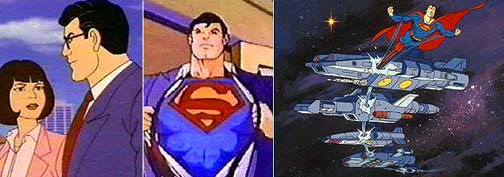
|
To acknowledge the 50th anniversary of the Man of Steel, Ruby Spears Enterprises produced a new animated series of Superman adventures, in 1987. Helmed by DC comic scribe Marv Wolfman, with animated character designs by legendary DC artist Gil Kane (and storyboards inspired by the panel art of equally legendary Neal Adams), the previous two decades' poorly-animated, generic Superman TV cartoons, and too-often campy Superfriends variations were discarded, replaced by more 'up-to-date' characterizations, reflecting many of the changes in the comic book during the 1980s.
Each episode offering two stories (one current, and one, of Superman's 'Early Years'), the series, while not as 'cutting edge' as the next decade's hit series, was praised for it's more mature, believable storylines, and the respect it showed the Superman mythos.
Sadly, poor scheduling and incredibly high licensing fees would end the series after a single season, but it was a truly fitting tribute to a half-century of the 'World's Greatest Superhero'!

|

|
Alexander and Ilya Salkind produced this syndicated series, distributed by Viacom (first filmed at the Disney/MGM Studios in Orlando, Florida, then at Universal Studios in Orlando), which would foreshadow the next decade's "Smallville" as a look at the years prior to Superman's adventures as an adult. This version, however, used the earlier comic book 'take' on the character, as an already established super hero, now attending "Shuster" University, in "Siegelville", Florida (in a nod to Superman's creators).

|

|
With hunky novice actor John Haymes Newton (1965- ) initially cast as Superboy/Clark Kent, Stacy Haiduk (Newton's offscreen girlfriend) as Lana Lang, James Calvert (in Season One) as 'Jimmy Olsen'-ish T.J. White (son of Perry, and Clark's best friend), and a rather two-dimensional Scott Wells as Lex Luthor, the series offered far better FX than Superman's television incarnation of the 1950s, although most of the early plotlines were equally mediocre (with a few exceptions). The series did benefit, however, by the casting of veteran stars Stuart Whitman and Salome Jens as Jonathan and Martha Kent, and guest appearances by legendary actors like George Chakiris, James MacArthur, and a perfectly-cast Michael J. Pollard (as the comic book-inspired dimensional troublemaker, Mr. Mxyzptlk).

|
Unfortunately, Newton's acting ability was not his strong suit, and his stilted portrayal frequently came under criticism by both fans and the press. Compounding this, he had some publicized traffic-related scrapes with the local police (resulting in a DUI), then, as a last straw to the tight-fisted Salkind, Newton demanded a 20% payraise, based on the physical risks of the flying scenes. It was quickly decided he would not return for Season Two (a move that genuinely surprised and upset the young actor, although, as time passed, he would build a respectable career on television, and renew his friendships with Ilya Salkind, and his former castmates).

|
The lead would be recast, with Julliard graduate and lifelong Superman fan Gerard Christopher (1958- ) assuming the role (and Sherman Howard taking over as Lex Luthor, providing much more flamboyance to the character). Despite looking a bit old as a teenaged hero, Christopher, an excellent actor, offered greater charisma and sincerity, as well as a potent sexual chemistry with Haiduk, and soon became a fan favorite. "Superboy" episodes really 'took off', with entertaining, imaginative twists on the classic formula, often featuring villains from the comic books, scripted by established "Superman" writers. From the second season on, "Superboy", later renamed "The Adventures of Superboy", became a 'Top Ten' hit in syndication.

|
The series would move on, as Clark and Lana began an internship at an agency investigating paranormal phenomena...and at the same time, Tim Burton's reinvention of "Batman", starring Michael Keaton as Bruce Wayne/Batman, and Jack Nicholson as the Joker exploded onto movie screens, raking in over $411 million, worldwide, erasing the silliness of the 60s TV comedy, and re-establishing DC characters as bankable movie commodities. The situation wasn't lost on Salkind, who attempted to revive the "Superman" film series with a storyline that would feature Brainiac (introduced yet again!), and the death and resurrection of the Man of Steel, ignoring the three sequels. While Gerald Christopher immediately expressed interest in playing Superman, Salkind did not want to shut down the successful TV series...and the producer felt confident that Christopher Reeve, approaching his 40th birthday, could still be convinced to don the cape one last time.

|
Reeve would deny any interest in returning to the role, on nationwide television, but Ilya Salkind's problems were really just beginning. When a Salkind-produced "Christopher Columbus" film project fell apart, father Alexander refused to return millions he borrowed from son Ilya, creating a rift that lasted until the senior Salkind's death, in 1997. Ilya's plan for a new "Superman" film was first snubbed by Viacom, and then rejected by Warner, itself. The studio, enjoying huge "Batman" profits, decided that the Salkinds had reaped the rewards of the Man of Steel long enough, and ordered DC Comics to reduce their support of "The Adventures of Superboy", and refuse any further requests to use DC characters in the series.
Salkind saw the writing on the wall, knowing that without DC's support, he would be forced to cancel the series, and that the lucrative two-decade partnership with Warner and DC Comics was coming to an end. This was particularly hard news for Gerard Christopher, who had invested money in the series, becoming an Executive Producer, and had hoped to direct future episodes. Suddenly, his future was in jeopardy, with the only ray of hope being that, with over 100 episodes filmed, the series' reruns would be a prime candidate for a profitable syndication.
But that hope was soon dashed, as Viacom, Warner, and Salkind fought over how much of the series each controlled. Mired in court battles, the series' reruns would never be syndicated. Until the DVD "Superboy: Season One" collection was allowed to be released (through Warner Home Video), in 2006, 14 years had passed since the series had last been widely seen, costing the production team (including Christopher) millions in the potential revenue the reruns might have generated, and the cast, royalties and the career 'perks' continued exposure could have offered.
Adding even more salt to the wound, Warner decided the poor DVD sales of "Season One" (undeniably, the weakest season, starring John Haymes Newton), didn't justify any further investment or involvement, so Gerard Christopher's far stronger second season "Superboy" debut and subsequent seasons of very successful, popular episodes may never be seen, again...

|
A tragic, unfair ending to a very praiseworthy series, and a gifted performer at the brink of a potentially major career, as well as the careers of the rest of "The Adventures of Superboy's" cast of promising, very talented actors!

|

|
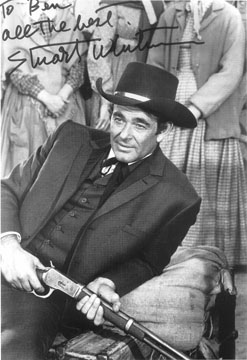
|

|
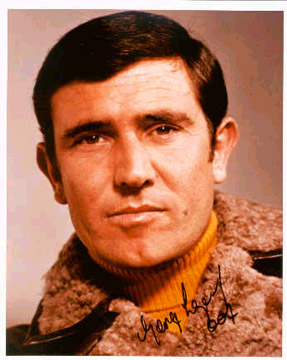
|

|

|
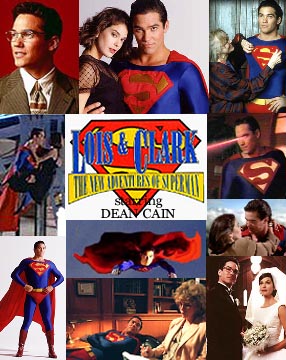
|

|
As the Man of Steel was returning to the fold under the Warner banner, the media conglomerate looked for new ways to promote him. Discovering a script treatment by DC Comics current publisher, Jenette Kahn, emphasizing the romantic interplay of Lois Lane and Clark Kent over Superman's customary superheroics, the studio saw potential (and a far more managable potential budget, involving fewer special effects), and hired writer/producer Deborah Joy LeVine (who'd penned the failed but well-received TV series, "Equal Justice", two seaons earlier) to flesh it out, and create a TV-movie pilot episode. LeVine wasn't interested in a superhero-based series, but, like Kahn, loved the idea of a 'Thin Man'-style romantic adventure, and "Lois & Clark: The New Adventures of Superman" was born, retelling the Superman saga in more adult terms, focusing on the sexual chemistry between a smart, very sexy Lois Lane, portrayed by frequent "MacGyver" guest star, Teri Hatcher (1964- ), and a more sharply defined and equally sexy Clark Kent.

|
The actor cast as Clark/Superman was crucial to the series' success, and the production team was surprised that a perfect candidate tested nearly immediately; unfortunately, having portrayed "Superboy" for three seasons just didn't fit in with LeVine's desire for a 'fresh' look, so Gerard Christopher, struggling for acting jobs since his series ended, was dropped. With two candidates still in the running, LeVine bucked conventional wisdom by choosing more ethnic, youthful Dean Cain (1966- ), over future "Hercules" Kevin Sorbo (1958- ). Cain, the adopted son of director Christopher Cain, was Hawaiian with some Japanese ancestry, had been a college football star at Princeton (with a contract to play with the NFL Buffalo Bills, until a knee injury ended his career), and was a gifted writer, as well as actor. He brought charm, humor, and an athlete's grace to the role...but his nonconventional 'look' would never achieve the kind of acceptance from die-hard fans that the previous actors in the role had enjoyed.

|
Under LeVine's supervision, much of the Superman saga would be rewritten (Jonathan and Martha Kent would survive, and remain an active part of Clark's life; Lex Luthor would become a millionaire industrialist...with hair...and enamored of Lois; at the 'Daily Planet', sexually carnivorous gossip columnist Catherine 'Cat' Grant, played with 'Mae West' bravado by Tracy Scoggins, would attempt to woo Clark away from Lois); despite the changes, the familiar characters everyone loved were still present, with Michael Landes as a darker, more mature Jimmy Olsen, plain-spoken Lane Smith as an Elvis-loving Perry White, John Shea as a sexy Lex Luthor, and the delightful Eddie Jones and K Callan as the Kents. While studio and network pressure would force LeVine to utilize Superman and his powers far more than she wanted, and the Family Hour time slot ABC allotted the series limited how 'mature' plotlines could be, the Lois and Clark romance would still have plenty of room to shine.

|
While television critics were kind to the new interpretation of the Superman Mythos, ABC had given the freshman series a nearly impossible task, pitting it against CBS Sunday Night Powerhouse, "Murder, She Wrote", and Steven Spielburg's pet project, the heavily-budgeted undersea adventure, "seaQuest DSV", (co-starring "Superboy" alum, Stacy Haiduk), on NBC. While Lois & Clark" would edge out the Spielburg series, both shows would be crushed by Angela Lansbury's geriatric sleuth. With a heavy investment in the series, ABC would not cancel their Superman series, but changes needed to be made for Season Two, changes that would cost the series LeVine and several cast members.

|
Warner felt Deborah Joy LeVine, while moving in the right direction, didn't fully understand some ratings-essential Superman traditions, and replaced her with Robert Singer, who had produced the cult favorite TV series, "Midnight Caller". Replacing the writing staff with more action-oriented scribes, attention was turned towards the cast. While Dean Cain's ethnicity in the role was a continuing problem (syndicated national radio DJ, Don Imus, skewered him, weekly, calling him a "Chinese Superman"...although Cain's heritage was Japanese, and only marginally, at that), too much money and time had been spent in promoting him, to drop him; there was no such compunction about dropping Michael Landes as Jimmy Olsen, however; he was too far-removed from the freckle-faced boyishness people expected (plus, new viewers, seeing the dark hair, often assumed he was Clark). From Season Two, on, young, sandy-haired Justin Whalin played the cub reporter/cameraman. Sexy Tracy Scoggins would also be dropped; her role was never well-enough written to provide any real competition for Lois (and a nymphomanic just didn't play well during Family Hour). Surprisingly, John Shea's Lex Luthor was also axed as a regular, as well; the romantic triangle between Lois, Clark, and Lex upset hardcore fans, who preferred Luthor bald and direct, not lovelorn. Singer & Company had to produce more superheroics within the tight budget, while not shortchanging, too significantly, the Lois and Clark romance, and without a Lex Luthor threat, the series regressed into 'Rescue Lois from the Villain of the Week' potboilers, too predictable, and edging ever closer to camp.
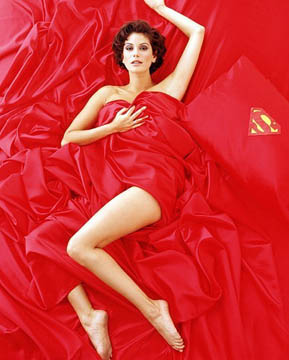
|
The saving grace of Season Two would be Teri Hatcher, whose unforced sexuality made her a superstar of the rapidly-expanding Internet. Photos of her, occasionally semi-nude, were downloaded in the thousands by adolescent boys, and provided the series with their most devoted fans. This fact would not be lost on the "Lois & Clark" production team, who, midway in the season, with the blessings of ABC, reintroduced the courtship as a major element. Ratings improved, immediately, and some of the more adult elements LeVine had initiated in Season One, reappeared. In the Season Two finale, after a 55-year courtship in print, radio, film, and television, Clark finally proposed to Lois (without revealing THE SECRET), and the series exploded out of the bottom of the weekly ratings, breaking into the Top 25 series, a near-miraculous turnaround! Neither ABC nor Warner had any intention of a short engagement, however, planning to milk the eventual nuptials for every ratings point it could offer...and the network quickly renewed the series for two more seasons! As Season Three premiered, ABC had a genuine hit on it's hands...
With a guaranteed ratings draw to open the season (as Clark revealed his secret identity...a decision demanded by young Internet fans, online, that producer Singer agreed with), the 'Curse of Prime-Time Television Couples' who consummate their relationships, commitment-wise, became a real, tangible fear. Ratings nearly always plummeted when the flirting, teasing, and courtship phase between leading players ended. From "Hennessey" to "I Dream of Jeannie", "Moonlighting", "Three's Company", and more, fans quit watching, and series died, which was why Matt Dillion never proposed to Miss Kitty, poor Della Street waited in vain for Perry Mason to examine her briefs, Little Joe Cartwright's bride dropped dead, Mary Richards never climbed into bed with her boss and moaned, happily, "Oh, Mr. Grant!!!", and every other perfect TV couple always backed away from anything resembling a ring. Singer, unwisely, chose to use traditional, obvious comic book tactics to delay the Season 'climax (Lois 'clones', robots, amnesia, etc.), which didn't fool anybody. Bitter fans quit watching, and ratings plummeted. Season Three went from triumph to disasater, and ABC's new bosses, at Disney, staring at a series that had apparently been gifted with an undeserved fourth season, ordered everyone to resolve the mess.
Coordinating with DC Comics (who had announced that Lois and Clark's Wedding would occur simultaneously on TV and in their comics), Season Four finally allowed the First Couple of Comics to wed, in an episode entitled "Swear to God, This Time We're Not Kidding", a title that wasn't that funny, to frustrated fans who'd been cheated for a year...

|
...Ratings continued to drop, particularly as the new Fox cable network introduced a modestly-produced, yet very hip, funny animated series against it, entitled "The Simpsons".
ABC and Warner still felt the series could limp through the remainder of Season Four, and into a fifth season, which would give the series the 100-episode requirement for successful syndication, and big potential profits for network and studio, and contracts were signed. Then Michael Eisner, at Disney, overrode the agreement, announcing that a revival of the Sunday Night Classic, "The Wonderful World of Disney", was usurping the "Lois & Clark" Sunday timespot for the remainder of the season, moving the series to Saturday nights, and certain cancellation. ABC was forced to pay Warner $40 million for reneging on Season Five, and even a very strong fan write-in campaign to bring the series back failed to move Disney. "Lois & Clark" died, with producer Robert Singer bitterly blaming the fans, for demanding the couple marry (a ridiculous charge, as it had always been planned, since the series' inception). Singer became persona non grata to most loyal Superman fans.
Dean Cain, after the cancellation, admitted he was afraid of heights! Despite typecasting (which has limited much of his film work to 'B' movies), he found success as a writer, guest star on TV series, and as the Producer/Host of TBS' "Ripley's Believe It Or Not!". Teri Hatcher co-starred with Pierce Brosnan in 1997's James Bond thriller, "Tomorrow Never Dies", guested on TV series for several years, then became a genuine superstar, on ABC's long-running mega-hit, "Desperate Housewives", starting in 2004, winning a Golden Globe Award in 2005, and Screen Actors Guild Awards, in 2005 and 2006.

|
And "Lois & Clark: The New Adventures of Superman" continues to have many devoted fans!

|
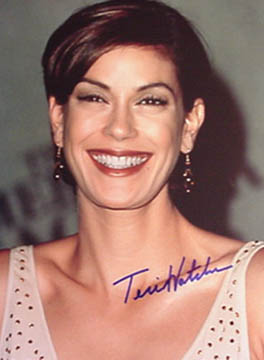
|

|
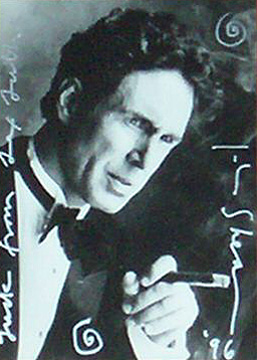
|

|

|

|

|

|
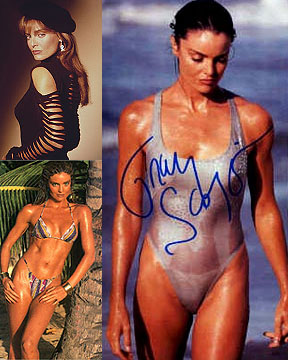
|

|
Even before "Lois & Clark" debuted, the Man of Steel was a major topic of conversation, as, in 1992, DC Comics KILLED him...
While most serious comics fans weren't alarmed (superheroes were frequently bumped off, then revived; it was great for sales), Superman's brutal slaying by supervillain, Doomsday was a tragedy that resonated in the press, world-wide, and the magazine issues detailing the tragedy became huge bestsellers!
All this wasn't lost on Warner, who was enjoying the profits accrued by the cinematic "Batman", and "Batman Returns", and the studio quickly put a movie version of Superman's death and ressurection into pre-production, with "Batman" producer Jon Peters in charge. Peters, a quick-tempered, semi-literate ex-hair stylist, had quit school in seventh grade, gotten into pictures through customer-then-girlfriend Barbra Streisand, and his aggressive, tenacious approach to production had created a lot of enemies, but also some hit movies, including Streisand's "A Star is Born", "Caddyshack", and "Batman".
The problem was, while Peters knew, liked and even identified with the vigilante, sociopathic 'Caped Crusader', he knew little of the noble, Messiah-like 'Man of Steel', and hated what little he did know. He quickly made it clear, his Superman would not wear silly red-and-blue tights and red boots, and definitely would not fly. He hired two different writers to put together scripts, but neither knew anything about Superman, and the scripts were just awful!
Warner, growing increasingly worried, brought in Kevin Smith to straighten things out. Smith, the already legendary Indie writer/producer/director/actor began his career while owning a New Jersey comic book shop, and produced his first film, "Clerks" by selling his comic book collection and maxxing out his credit cards. He knew Superman, and was stunned to discover no one ELSE in the production team did, least of all, Peters. When I spoke to Smith after a college lecture, a few years later, he was still incredulous ("How can you make a film without knowing the main character?")
Smith salvaged what he could from the first drafts, and attempted to placate Peters and maintain some fidelity to the Superman Mythos. Surprisingly, he succeeded, writing a script that everyone could live with.
Superstar (and lifelong comic book fan) Nicolas Cage, who had been lobbying heavily to play Superman in the new film (professing it had always been his dream), was signed for the lead, with a $20 million payday, when it was completed (or $2 million, if it wasn't made)...and Cage wasn't particularly disappointed that the famous red and blue suit was out...until his young son discovered his Daddy wasn't going to wear it. The resulting tantrum had Cage begging for at least ONE scene in the familiar costume. Peters and the studio (chuckling, I suspect) agreed to one scene (with Cage in a black bodysuit with a silver 'S', for the remainder of the film).

|
The director was the next hurdle. Smith lobbied for his friend Robert Rodriguez, whose "Desperado" and "From Dusk to Dawn" showed creative brilliance on a small budget, and was a comic book enthusiast. Rodriguez was unavailable, however, and the studio preferred bringing in "Batman" director Tim Burton. Despite the critical and box office fiasco of "Mars Attacks!" (cost: over $100 million, box office: $38 million), Warner execs still basked in the glow of the profits the Peters/Burton team had achieved with the first two "Batman" films (combined budget: $115 million; combined box office, worldwide: nearly $800 million). Burton came on board...and soon clashed with Smith, who discovered Burton cared even less about Superman and his 'rules' than Peters did! A never-ending stream of memos were launched, as Burton kept insisting on more and more farfetched plot twists (tubes coming in and out of Superman's body, a souped-up 'Supermobile' with lots of kid-friendly gadgets, a jetpack providing the new method of flight, Chris Rock as Jimmy Olsen, Jim Carrey as Brainiac and Tim Allen as Luthor...soon replaced by Kevin Spacey). Both director and writer howled to the front office about the other's interference, demanding more control. Despite promises made to Smith, Burton had more clout (and a $5 million 'Play or Pay' contract), so Kevin Smith was fired, and his script, tossed.
More writers were brought in, the script became even more farfetched (the studio would eventually resurrect Smith's script), and over $20 million was spent building sets. Peters and Burton frequently clashed, with the writers gravitating, script-wise, between the pair's opposing visions. The film deadline kept being pushed back (the only 'hard-and-fast' goal was for a release before the end of 1998, to stay within the 60th anniversary year), and the project's projected budget zoomed to over $200 million.
Meanwhile, the Tim Burton produced, Joel Schumacher directed "Batman Forever" (starring a sleepwalking Val Kilmer as Batman, opposing Jim Carrey's scenery-chewing Riddler, with poor Tommy Lee Jones, left in the dust behind Carrey's antics, as Two-Face), opened to decidedly mediocre reviews and box office. The plotline teetered perilously close to Adam West-style camp, and Schumacher promised loyal fans that he'd never let the franchise go the "campy TV route", again, a promise he'd break, immediately, with the odious, uber-campy "Batman and Robin", in 1997, universally panned by critics as the decade's worst film! A huge array of miscast, high-salaried major stars, headed by an uncomfortable George Clooney as Batman, and wildly mugging Arnold Schwarzenegger as Mr. Freeze, stumbled through garish sets, and stunk up movie screens, worldwide. It would take years to see any real profits on the $125 million production, costing Warner millions, and decisively ending Burton's involvement with Batman. Other major Warner releases would fare nearly as badly ("The Postman", "The Sphere"), and 1997 and 1998 became two of the worst years in the studio's recent history.
Risking any more money on another live-action "Superman" film suddenly did not seem so appealing. Despite Jon Peters' insistence that he could still make the film work, and the $40 million already invested, "Superman Lives" was quietly shelved, and any other "Superman" film ideas placed on the back burner until better times. Burton and Cage raked in their contractually promised $7 million, and both Peters and Burton were given new projects...Tim Burton's 'take' on Washington Irving's fantasy tale of Ichabod Crane and the 'Headless Horseman', "Sleepy Hollow", starring Johnny Depp, would earn a modest profit, while Jon Peters' big-screen adaptation of TV's "The Wild, Wild West", with guaranteed moneymaker Will Smith in the lead, bombed, miserably, ending Smith's string of hits, and losing Warner yet another fortune...
Despite the Will Smith fiasco, Peters was retained as a Superman asset and potential Producer, and would spend the next decade interviewing possible directors, and reviewing scripts...

|
In 1992, with the comic book Superman dead (at least for a while), four substitutes were introduced, to fill the void (and keep the Superman-titled magazines in business). One was a cyborg with secrets, one, an emotionless Kryptonian android, one, a Superman DNA-cloned youth, who would take the name, Superboy...and the last was an African-American engineer, John Henry Irons, who owed his life to Superman, and felt he could fulfill the Man of Steel's legacy by donning S-emblazened armor, with hi-tech weapons and devices, and serving citizens as "Steel" (yes, the description does sound more than a bit like Iron Man...). Steel was well-written and quite noble, and a definite step up for DC Comics, which had offered far fewer minority superheroes than Marvel. When the real Superman returned to action, the other three 'substitutes' would fade away (with 'Superboy' eventually resurfacing on TV), but Steel continued in the DC Universe, having earned his own place.
There was certainly a worthwhile film that could be made from all this...but the 1997 travesty, "Steel", wasn't it!
While basketball superstar, 7'1" Shaquille O'Neal (1972- ) was an avowed fan of the Man of Steel (with the 'S'-shield tattooed on his arm), the film version of "Steel" had nothing to do with Superman (Warner was afraid any link might 'type' the film, to audiences, as simply a sequel). Here, John Henry Irons is a brilliant military weapons designer (uh-huh), who, disgusted by governmental lies and cover-ups, and the neighborhoods he grew up in, rife with crime, builds the weapon-packed armor using his technology, to make the streets safe, again (even closer to Marvel's "Iron Man").
TV-veteran Kenneth Johnson's uninspired direction, a mediocre script with endless 'inside' jokes about basketball, and 'Shaq's' on-court career, and O'Neal's decidedly second-rate acting talent combined to make "Steel" a major disappointment for comics fans!

|

|

|

|

|
With the astonishing success of Bruce Timm's "Batman: The Animated Series", the public clamored for an animated revival of the hero who started it all, given the same level of sophistication...and with "Superman: The Animated Adventures", Timms delivered!
With plotlines that were faithful to the comic books, major stars providing voices, and a 'look' that paid homage to the classic Fleischer 1940s cartoons, the series was a critical success, and spun off a Justice League-themed sequel, introducing many lesser-known DC superheroes to audiences, and providing exciting animated adventures for a decade...

|
...And a NEW era for 'live' Superman adventures was about to begin...

|
 TOM WELLING and BRANDON ROUTH ~
TOM WELLING and BRANDON ROUTH ~
 LINKS ~
LINKS ~
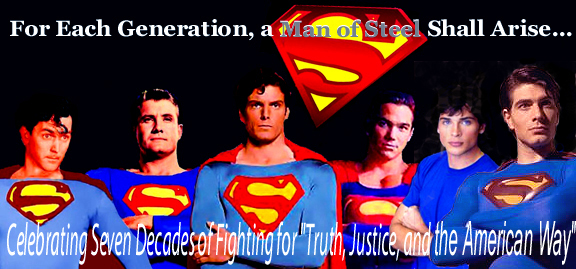
KIRK ALYN | GEORGE REEVES | CHRISTOPHER REEVE | DEAN CAIN | TOM WELLING | BRANDON ROUTH |
Click on the names for info on each actor from The Internet Movie Database...

|
|
The Superman WebRing This site is a member of the best Superman websites on the Internet! |
|
| |
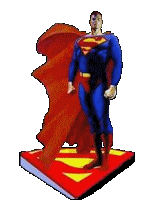

|

|
"Superman", the "Superman" logos and trademarks, and all related characters are the exclusive property of D.C. Comics, a subsidiary of Time Warner Inc. This is a fan-created site, for entertainment purposes, only, and is not affiliated with either D.C. Comics or Time Warner Inc.
Best viewed with
 . Send e-mail to the Webmaster
with questions or comments about this site.
. Send e-mail to the Webmaster
with questions or comments about this site.
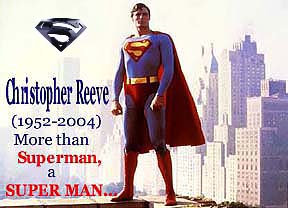 |
The Christopher and Dana Reeve Foundation is committed to finding treatments and cures for spinal cord injuries. To contribute, and learn more about the organization and its work, simply click on the picture above!
